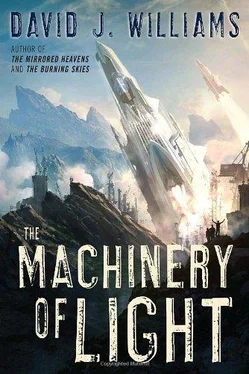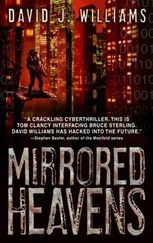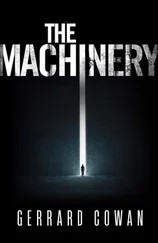“Consistent at any given instant. Not necessarily across instants, though—”
“Jesus,” says Lynx, “that’s why it’s been such a head trip.”

Lynx’s mind’s spinning, but it’s finally all starting to make sense. Sinclair reprogrammed them with the real memories of others, left so much latent—and tapped so much else to enable telepathy among his agents, breaking down the walls that are—
“Everywhere,” says Lynx.
Sinclair nods. “Space-time riddled with bubbles; quantum foam that pervades us, each bubble a momentary wormhole, and all of it entangled. And once you postulate that Einstein’s hidden variable is actually consciousness , then the mind’s real significance in driving nonlocality becomes apparent. Unless, of course, your civilization is so dysfunctional it’s based on blinding itself to the obvious. Of course minds can link. Animals do it all the time. Just watch flocks of birds changing direction. Or the hive minds of bees and ants. But the human animal shackled itself in chains of language—language that opened up new possibilities even as it foreclosed others—”
“I thought you said you blamed religion,” says Linehan.
“‘In the beginning was the Word’: what the fuck do you think language is? How else do we label the universe?—and so much of that labeling is the papering-over of things we don’t understand. Why do humans have to be so fucking certain about everything even when they know nothing?”
No one says anything.
“I’ll tell you why. They don’t have the strength to gaze into abyss.”
“Unlike you,” says Haskell.

His eyes snap toward her, and she’s wondering if he’s realized what’s up with the screens. Or if he’s way ahead of her …
“I’m going to find you,” he says.
“You can try,” she says.
“But she’s right there,” says Linehan.
“I’m talking about her awareness,” says Sinclair. “On what sunless seas is she traveling? What stars gleam in the spaces through which she’s soaring? Is she even now beachcombing the shores of inflating universes?”
“She is,” she whispers—he’s right. They stretch all about her, whole hierarchies of dimensions, endless grids of no-grids, vast innation fields, pure information begetting endless chains of existence ripping past her, each one described by a wave-function that in itself describes a whole multiverse within it, infinite possibilities of some larger megaverse , the myriad paths stretching out on all sides and she can only see just a fucking fraction of it all. She takes in the plight and promise of infinite humanities, sees too—
“Tell me we’re not the only ones,” says Sinclair.
“We’re not,” she replies—sees in his eyes that he gets it, knows he can’t wait to see it—the limitless forms of life that populate existences—so many of those worlds just life and nothing more and some of them rising up toward intelligence, and some of that intelligence becoming starfaring—
“But what about in here?” says Sinclair.
“I see nothing,” she says.
“Nothing’s managed to slip between the cracks of time?”
“What the fuck are you talking about?” asks Carson.
“I’m talking about the competition,” says Sinclair.
“You mean aliens?” asks Linehan.
“They wouldn’t even have to be that,” says Sarmax. “Could be any other humanity that’s managed to crack the code—”
“We have to assume others have done it,” says Sinclair. “Have to assume that they’re out there, maybe maneuvering against us even now—”
“Other Sinclairs,” says Sarmax.
“Other Haskells,” says Lynx. “Infinite numbers who have accomplished—”
“There are,” she says. “They’ve converged.”
“Meaning what?” asks Carson.
“They’re all me.”
 Linehan’s the only one I might be able to get to
Linehan’s the only one I might be able to get to
The voice rings out clear within him, but it’s not telling him anything he doesn’t already know. Sarmax is going to side with Sinclair rather than face a life without the woman he lacked for so long. Lynx will play the chameleon to the end. And the Operative can only wonder if Sinclair has planted some last trick within his head. He glances at him again—sees that he’s focused only on Haskell now—
“So you’re really a nexus,” says Sinclair.
“There must be others—”
“Presumably. That’s what makes this so exciting.”
“That’s why you said you didn’t want to go back.”
“And now you see what I mean. It’s like we’re on a ladder. All we can do is climb the rungs. All this talk about world-conquest, and all it signifies is how small everybody’s been thinking. The whole point of the eternity-game is to get out there and stretch your legs.”
“Eternity?” asks Lynx.
“Every last one of them,” says Sinclair.
“You can make me live forever?”
“Been wondering when you’d get around to asking that.”
“Stefan,” says the Operative, “back off.”
“What do you mean?” asks Lynx.
“I mean he’s tempting us with whatever we most desire.”
“More than just tempt,” says Sinclair.
“You can really deliver?” asks Lynx.
“Haskell’s already cheated death. No reason the rest of us can’t either.”
“Has it occurred to you that might be a bridge too far?” says the Operative.
“No need to get all mystical,” says Sinclair. “Death is merely the ultimate event horizon. And Claire’s already crossed it. She’s seeing things that no one has a hope of seeing until they expire. Access to states of consciousness that one typically has to give up the body to get to—”
“I did give up my body,” she says.
“But I have yet to cut the cord,” he replies.

Which you’d be a fool to do.”
Except she’s nowhere near as confident about that as she’s trying to sound. Even though her body seems just like a fiction to her now, she’s under no illusions that it gives Sinclair advantage. She feels like a balloon on a tether that he’s controlling—feels like all her purview is merely a function of his sufferance, that everything that’s happened is still part of the way he intended it. She takes in the Room, an anchor far beneath her—takes in the way it hangs amidst nothing, superimposed against the core of the Moon of one universe in particular, superimposed against all those other Moons in all those other universes—all of them resolving themselves into Sinclair’s face. She can see he’s only looking at a few of the images on those screens now—that many of the remaining screens are starting to wink out. That he’s almost narrowed down her coordinates. That as soon as that happens—
“You’re mine, child. You can’t escape that—”
“But whose are you?”
“I think you know the answer to that.”
But she doesn’t. Not when the real question is how this all began. Did Matthew Sinclair become the tool of some entity that reached in from beyond to give him guidance as part of some unholy barter? Or did he accomplish this all on his—
“What makes you think there’s a difference?” he asks.
Читать дальше



 Linehan’s the only one I might be able to get to
Linehan’s the only one I might be able to get to











